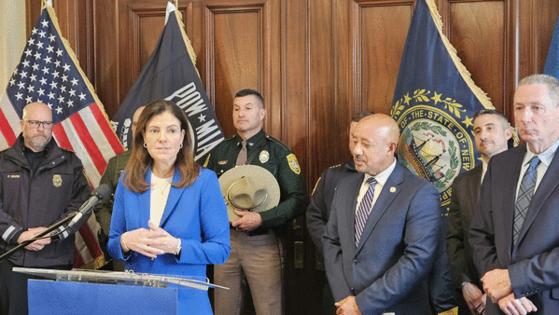New Hampshire bans sanctuary cities and policies preventing ICE cooperation
Published in News & Features
The differences between Massachusetts and its neighbor to the north grew beyond their divergent takes on sales and income tax after Gov. Kelly Ayotte signed a ban on “sanctuary cities” into law.
According to the former U.S. Senator, the law she signed Thursday is just another example on a long list of things that make the Granite State different from the Bay State — and she clearly does not point out the distinction as a compliment.
“I said from the beginning that we won’t let our state go the way of Massachusetts and their billion-dollar illegal immigrant crisis. Today, we’re delivering on our promise by banning sanctuary cities and supporting law enforcement cooperation with federal immigration authorities,” the governor said in a statement.
While there is no strict definition of what makes a sanctuary city, the term is generally used in reference to jurisdictions that do not allow local authorities to participate in civil immigration processes. Most cities, towns, and states that hold those sorts of policies push back on the “sanctuary” name, insisting that immigration is a federal matter and best kept separate from local law enforcement.
The Bay State, for example, is not a sanctuary state as far as Gov. Maura Healey sees it, even if the state’s Supreme Judicial Court made it very clear that “Massachusetts law provides no authority for Massachusetts court officers to arrest and hold an individual solely on the basis of a Federal civil immigration detainer, beyond the time that the individual would otherwise be entitled to be released from State custody.”
Boston is another example. Michelle Wu answered a question by members of Congress on whether the city is a “sanctuary city” by saying that it’s a “safe” city made all the safer by rules preventing officials from asking after immigration status when providing services or enforcing local laws.
New Hampshire doesn’t have any “sanctuary” cities or towns — officially — but does have a few communities which have acted to label themselves as “welcoming” jurisdictions.
For example, Lebanon has a “welcoming” ordinance on the books which directs that “no Agent or Agency of the City of Lebanon, including Law Enforcement, shall aid or participate in immigration enforcement actions.”
The law signed on Thursday expressly bans any “law, policy, practice, procedure, or custom adopted or allowed by a state entity or local governmental entity which prohibits or impedes a law enforcement agency” from activity “which prohibits or impedes a law enforcement agency from communicating or cooperating with a federal immigration agency.”
According to the governor, policies which shelter law breakers will no longer be allowed in her state.
“New Hampshire will never be a sanctuary for criminals, and we will keep working every day to remain the safest state in the nation,” she said.
_____
©2025 MediaNews Group, Inc. Visit at bostonherald.com. Distributed by Tribune Content Agency, LLC.







Comments